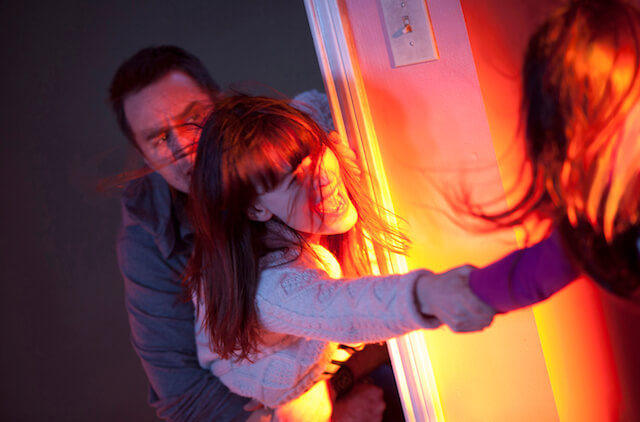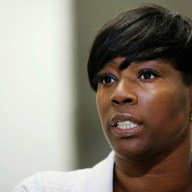‘Poltergeist’ There’s a good hook, actually, in the “Poltergeist” remake that should have justified its existence. The 1982 original — directed by Tobe Hooper, or, if you believe the rumors, by producer Steven Spielberg — preyed upon the growing trend towards “planned communities”: the cloistered, remote oases of suburbia where the middle class could cut themselves off together from the miseries of the outside world. In the redo, the suburb to which our central fam — the Bowens, led by Amy (Rosemarie DeWitt) and Eric (Sam Rockwell) — relocate has seen better days. The houses are on the cheap because many of them have been foreclosed-upon. The Bowens themselves have fallen on hard times, Eric still jobless after been made redundant, and Amy, a vague writer, working on some vague book but basically an SAHM. This is a good angle for a horror film, preying upon fears of economic upheaval — the terrorized now terrorized by forces even more outside their control than a weak economy. But once the ghosts come a-knockin’, it’s incredible how little follow-through goes on. It just turns into a ghost movie, and one faintly reminiscent of a classic you first saw as a kid. Indeed, the “Poltergeist” redux is the equivalent of a Wikipedia plot summary. It hits all the beats, or modifies a couple of them, but more or less just hits them, with little of the feeling. The most lame change-up is that the doomed suburban manse is now built upon a regular burial ground. (“It’s not like it was on an ancient burial ground,” someone jokes, as if an ancient burial ground wouldn’t be so much scarier.) There’s now, in addition to a little boy and a littler, and more in-danger girl, a teen daughter, who exists primarily to get in a dig at bored, snotty and tech-imprisoned teens. Diminutive paranormal whiz Zelda Rubenstein has been turned into Jared Harris, as you do. Rubenstein was an awful ham, but at least she was memorable. DeWitt is uncannily like original mom JoBeth Williams: spunky, alert, flirty, sometimes in short-shorts. DeWitt, like Rockwell — plus Harris and Jane Adams, as another paranormal expert, because you can never have too many — is grossly overqualified for a shoddy horror remake, but she doesn’t act like she’s above it. Her mom is teeming in Rosemarie DeWitt-ness. And yet once youngest daughter Maddie (Kennedi Clements) — pointedly not named Carol Anne, as surely no one who saw the original “Poltergeist” would ever name their daughter Carol Anne — gets sucked into the netherworld of unhappy, displaced spirits, her maternal anguish never has a chance to hit the stratosphere. Even with DeWitt freaking out in fine fashion, you get the sense Amy wants her daughter back because that’s what the plot dictates, not because she means it deep down. (Rockwell, meanwhile, seems alive for awhile, but when the effects take over you’ve rarely seen a great actor give less s—s.) There’s a reason DeWitt gets shortchanged: the focus has shifted from, in the original, the mother-daughter relationship to, here, brother-daughter. The closest to a central figure is young Griffin (Kyle Catlett), an easily spooked, traumatized ball of nerves who when asked what he’s scared of replies, “Everything.” When the ghosts make their first big offensive on the house, while the parents are away, Griffin doesn’t adequately protect Maddie, meaning the rest of the film revolves around his guilt. Or it should, but once the effects start happening in earnest most is forgotten that isn’t wan repeats of the old set pieces, or simply quadruple-downing on scary clowns. As if out of desperation, it even goes into The Other Side, showing what director Hooper — and/or Spielberg — decided would be scarier left to the imagination. Director Gil Kenan, who directed the nifty (and Spielbergian!) “Monster House,” seems to be trying to build sequences with prowling camerawork. But he never works up a coherent vision, and instead the film half-engagingly trods through the plot points en route to a shruggy conclusion. What starts out as its own thing becomes the equivalent of a summary, and a summary, as an old professor once said, will get you an F.
Director: Gil Kenan
Stars: Rosemarie DeWitt, Sam Rockwell
Rating: PG-13
2 (out of 5) Globes
The ‘Poltergeist’ remake almost justifies its existence

20th Century Fox, MGM
Follow Matt Prigge on Twitter @mattprigge


















